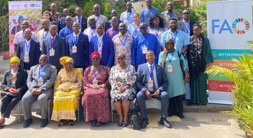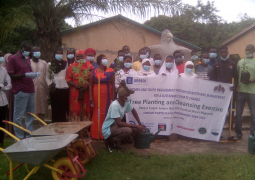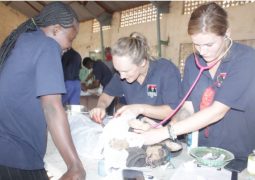
The project was implemented by FAO of the UN in collaboration with the Swedish International Development Cooperation Agency (SIDA) and the Economic Community of West African States (ECOWAS).
The objective of the project was to strengthen decision-making on forests and land management by improving knowledge of forest dynamics, supporting the reform of forest legal frameworks, and demonstrating and sharing community-based best forestry practices across the West African sub-region and globally.
Dr Gouantoueu Robert Guei, coordinator of the FAO sub-regional office for West Africa highlighted the challenges the sub-region faces due to the effect of climate change. He noted that Africa contributes only 1.8% to global greenhouse gas emissions.
However, he said the agricultural sector, which was crucial in the region, accounts for about 30% of greenhouse gas emissions and, along with forest exploitation, is one of the main drivers of deforestation.
Dr Robert Guei added that according to the FAO Forest Resources Assessment 2020, annual forest loss in west and central Africa was estimated at 1.9 million hectares between 2015 and 2020.
Ms Moshibudi Rampedi, FAO country representative said the initiative serves as a beacon of hope, showcasing tangible solutions at the community level by effectively supporting the cause. She stated that FAO in The Gambia is not only demonstrating its commitment to sustainable forest and land management but also fostering local ownership and resilience building.
Ms. Rampedi said FAO had programme priority actions and underscored a strategic alignment with key global objectives, particularly for environmental sustainability and agricultural productivity.
Rohey John Manjang, minister for Environment, Climate Change and Natural Resources emphasised government's unwavering dedication and commitment to sustainable forest management and biodiversity conservation.
Minister Manjang stated that deforestation and land degradation were a major environmental problem. However, she said through sustainable forest management efforts, they could improve the productivity of their agricultural land and thereby enhance the food security of local communities and the attainment of the objectives of the National Development Plan (NDP).
Massandje Toure-Liste, ECOWAS Commissioner encouraged representatives of the Member States and local communities to continue to play their part in the project by developing and implementing operational synergies that reconcile ecosystem management and climate change mitigation.
Joachim Beijmo, head of Regional Development Cooperation in Africa, Swedish Embassy in Addis Ababa emphasised the importance of initiatives that focus on sustainable forestry to benefit both people and the climate. He expressed satisfaction with the project's progress thus far conveying enthusiasm for the upcoming developments.




